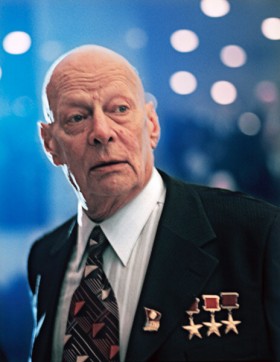Related Research Articles

The Lomonosov Gold Medal, named after Russian scientist and polymath Mikhail Lomonosov, is awarded each year since 1959 for outstanding achievements in the natural sciences and the humanities by the USSR Academy of Sciences and later the Russian Academy of Sciences (RAS). Since 1967, two medals are awarded annually: one to a Russian and one to a foreign scientist. It is the academy's highest accolade.

Igor Vasilyevich Kurchatov, was a Soviet physicist who played a central role in organizing and directing the former Soviet program of nuclear weapons.

Yakov Borisovich Zeldovich, also known as YaB, D.N. was a leading Soviet physicist of Belarusian origin, who is known for his prolific contributions in physical cosmology, physics of thermonuclear reactions, combustion, and hydrodynamical phenomena.

Moscow Institute of Physics and Technology, is a public research university located in Moscow Oblast, Russia. It prepares specialists in theoretical and applied physics, applied mathematics and related disciplines.

The Ioffe Physical-Technical Institute of the Russian Academy of Sciences is one of Russia's largest research centers specialized in physics and technology. The institute was established in 1918 in Petrograd and run for several decades by Abram Ioffe. The institute is a member of the Russian Academy of Sciences.

The Joint Institute for Nuclear Research, in Dubna, Moscow Oblast, Russia, is an international research center for nuclear sciences, with 5500 staff members including 1200 researchers holding over 1000 Ph.Ds from eighteen countries. Most scientists are scientists of Russian Federation.

The Lenin Prize was one of the most prestigious awards of the Soviet Union for accomplishments relating to science, literature, arts, architecture, and technology. It was originally created on June 23, 1925, and awarded until 1934. During the period from 1935 to 1956, the Lenin Prize was not awarded, being replaced largely by the Stalin Prize. On August 15, 1956, it was reestablished, and continued to be awarded on every even-numbered year until 1990. The award ceremony was April 22, Vladimir Lenin's birthday.

Science and technology in the Soviet Union served as an important part of national politics, practices, and identity. From the time of Lenin until the dissolution of the USSR in the early 1990s, both science and technology were intimately linked to the ideology and practical functioning of the Soviet state and were pursued along paths both similar and distinct from models in other countries. Many great scientists who worked in Imperial Russia, such as Konstantin Tsiolkovsky, continued work in the USSR and gave birth to Soviet science.

Anatoly Petrovich Alexandrov was a Russian physicist who played a crucial and centralizing role in the former Soviet program of nuclear weapons.

Nikolay Nikolayevich Bogolyubov was a Soviet and Russian mathematician and theoretical physicist known for a significant contribution to quantum field theory, classical and quantum statistical mechanics, and the theory of dynamical systems; he was the recipient of the 1992 Dirac Medal.

The State Prize of the Russian Federation, officially translated in Russia as Russian Federation National Award, is a state honorary prize established in 1992 following the breakup of the Soviet Union. In 2004 the rules for selection of laureates and the status of the award were significantly changed, making them closer to such awards as the Nobel Prize or the Soviet Lenin Prize.

Abram Isaakovich Alikhanov was a Soviet experimental physicist of Armenian origin who specialized in particle and nuclear physics. He was one of the Soviet Union's leading physicists.
Yevgeny Ivanovich Zababakhin, was a Soviet physicist who was one of the senior chief designers of nuclear discharges of the Soviet nuclear weapons.

Yuri Alexeyevich Trutnev was a Russian physicist and a professor of engineering at the National Research Nuclear University MEPhI.

The Global Energy Prize is an international award in the field of energy industry which is given for "outstanding scientific research and scientific-technical developments in the field of energy which promote greater efficiency and environmental security for energy sources on Earth in the interests of all mankind".

The National Science Center Kharkiv Institute of Physics and Technology (KIPT) (Ukrainian: Національний науковий центр «Харківський фізико-технічний інститут»), formerly the Ukrainian Physics and Technology Institute (UPTI) is the oldest and largest physical science research centre in Ukraine. Today it is known as a science center as it consists of several institutes that are part of the Kharkiv Institute of Physics and Technology science complex.

Yuri Tsolakovich Oganessian is a Soviet, Armenian and Russian nuclear physicist who is best known as a researcher of superheavy chemical elements. He participated with the discovery of multiple elements of the periodic table. He succeeded Georgy Flyorov as director of the Flyorov Laboratory of Nuclear Reactions at the Joint Institute for Nuclear Research in 1989 and is now its scientific director. The heaviest element known of the periodic table, oganesson, is named after him, only the second time that an element was named after a living person.
References
- ↑ "Золотые медали Российской академии наук". www.ras.ru.
- ↑ "Кадырова наградили медалью за вклад в развитие ядерной физики". Настоящее Время (in Russian). 5 May 2023.
- ↑ "Евгению Велихову присудили золотую медаль имени Курчатова". Общественная палата Смоленской области (in Russian). 4 January 2023.